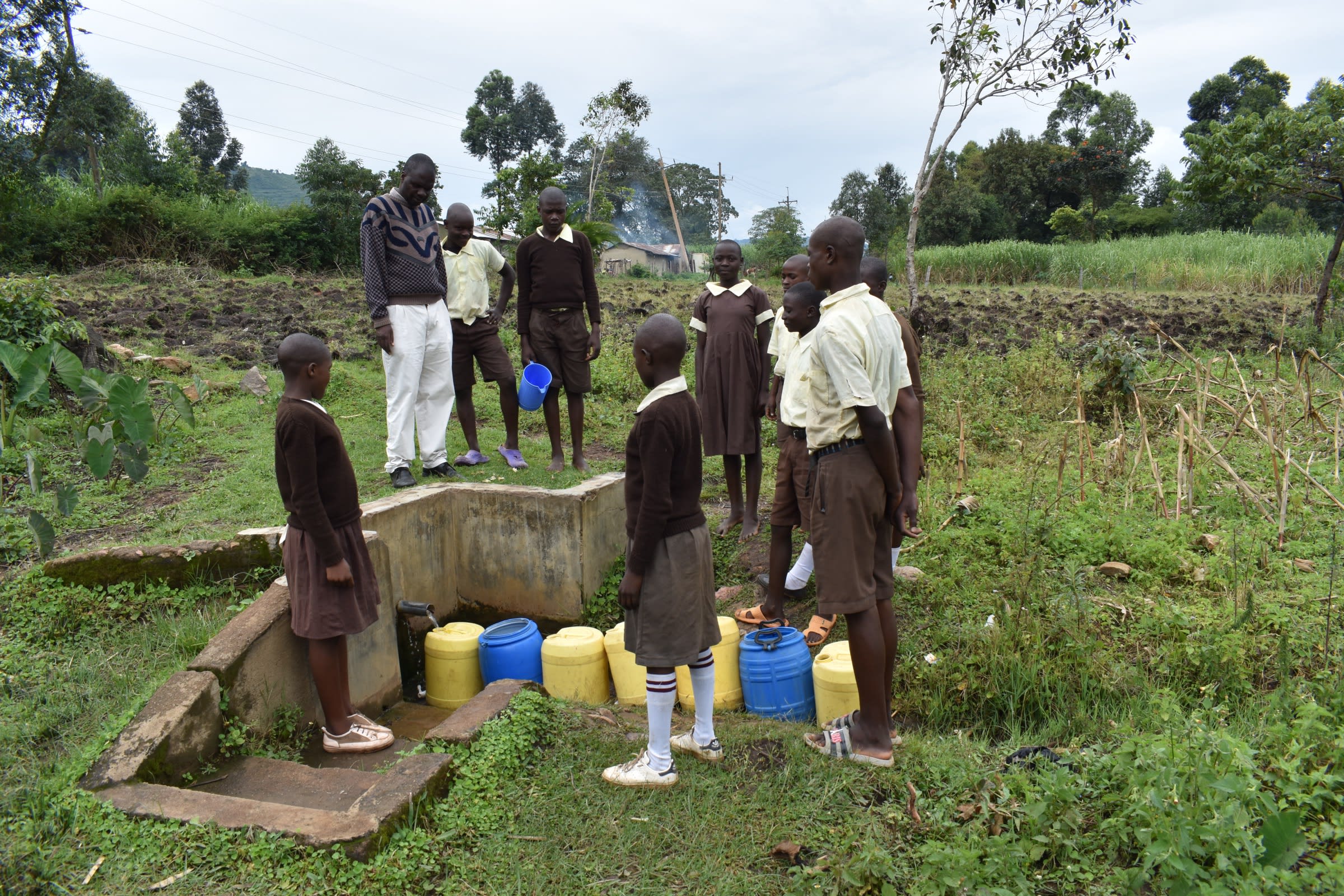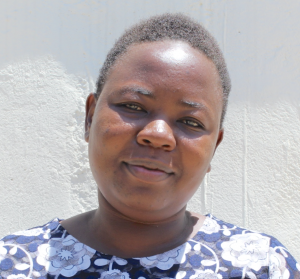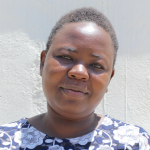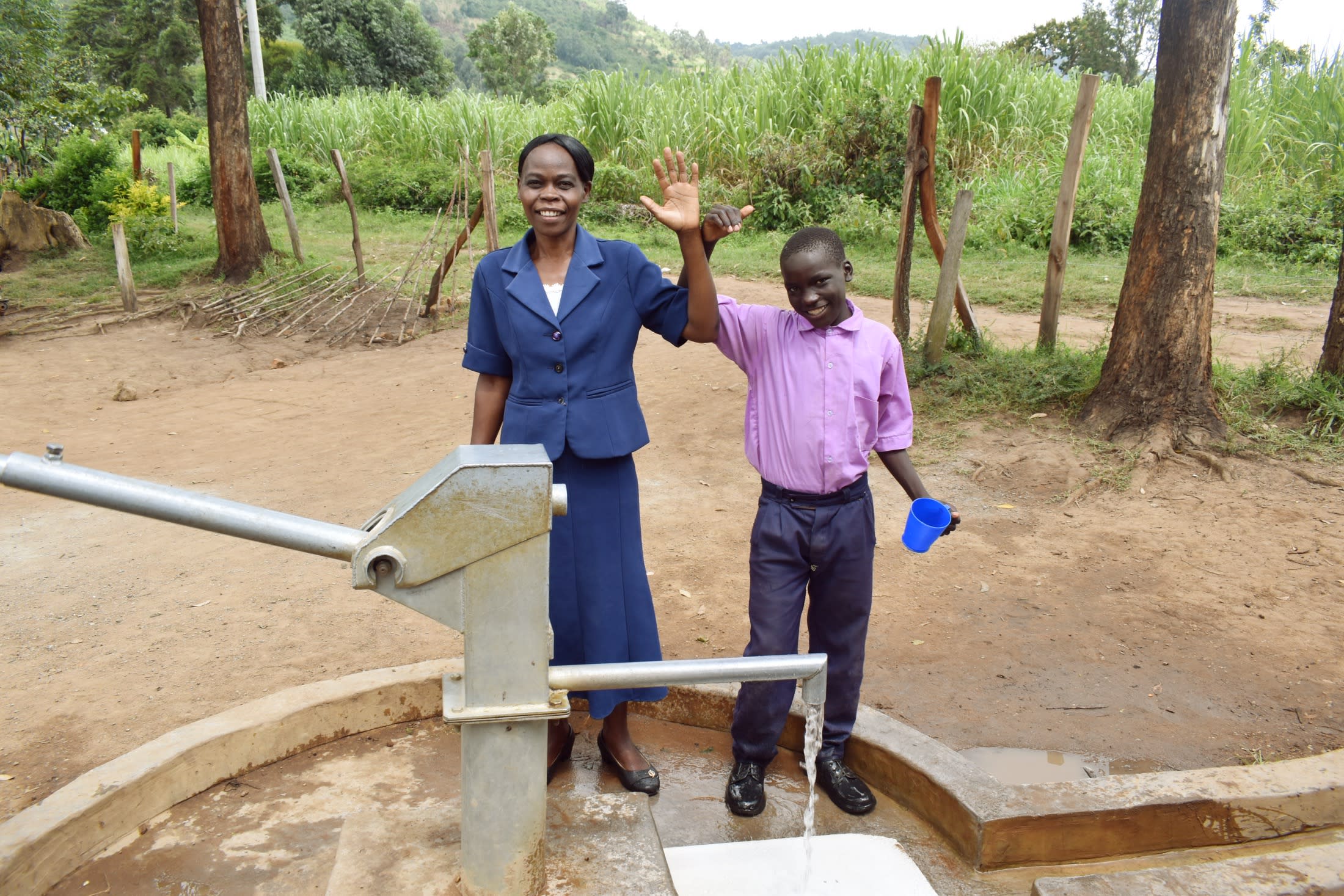Ideally, during class time, students should be in their seats, listening to their teachers. But too often, at Lukhokho K. Primary School, the unlucky few chosen from the 511 students find themselves instead wandering outside school grounds for water.
When these students finally get to the spring, they have to wait in line behind community members, with whom the spring is shared. And the spring is notorious for a low discharge rate, which means while other students are learning, those sent to fetch water are waiting in line or staring at water slowly dribbling into their jerrycans.

"The source has low yield," explained teacher Sammy Munanga, 48 (he's pictured above with students at the spring). "So when escorting students to fetch water, we normally take a lot of time, especially when we find community members at the water point. This has affected our performance because we do not cover the syllabus on time."
Although the spring was once protected, it has since fallen into disrepair. There are farms nearby whose fertilizer no doubt enters the spring's catchment area. Students should be able to concentrate in class, and not worry about the quality of the water they're drinking.
13-year-old student Ruth explained: "I was one of the victims where I missed school sometime back because I had [a] bad sore throat and stomachache because of drinking the water. This made me miss sitting for [the] midterm exam. I was not happy."
And although the school has tried to keep up with cleaning its compound, it's hard to do with water in short supply. Things like latrine hygiene and personal hygiene are lacking, which likely isn't helping to curb the students' illnesses.
With a safe, reliable water source within the school compound, students will no longer have to miss class, drink unclean water, or learn in an unclean environment.
What We Can Do:
New Well
We conducted a hydrogeological survey at this school and the results indicated the water table beneath it is an ideal candidate for a borehole well. Due to a borehole well's unique ability to tap into a safe, year-round water column, it will be poised to serve all of the water needs for this school's large population, even through the dry months.
The school will help collect the needed construction materials such as sand, rocks, and water for mixing cement. They will also provide housing and meals for the work team, in addition to providing local laborers. We will complement their materials by providing an expert team of artisans and drilling professionals, tools, hardware, and the hand-pump. Once finished, water from the well will then be used by the school’s students and staff for drinking, handwashing, cooking, cleaning, and much more.
Handwashing Stations
There is currently nowhere for students to wash their hands after using the latrines or before eating lunch, let alone the water to do so.
The student health club will oversee the two new handwashing stations we will provide, and make sure they are kept clean and in working condition. The club leaders will fill the handwashing stations with water daily and make sure they are always supplied with a cleaning agent such as soap or ash.
VIP Latrines
We will construct two triple-door latrine blocks using local materials that the school will help gather. Three doors will serve the girls and three doors will serve the boys. All of these new latrines will have cement floors that are designed to be easy to use and to clean. And with a borehole right on school property, there should be enough water to keep them clean.
Training on Health, Hygiene, COVID-19, and More
We will hold a one-day intensive training session with students, teachers, and parents. This training will cover a wide range of topics including COVID-19 symptoms, transmission routes, and prevention; personal and environmental hygiene; and the operation and maintenance of the borehole, latrines, and handwashing stations. There will be a special emphasis on handwashing.
Our team of facilitators will use a variety of methods to train, including participatory hygiene and sanitation transformation, and asset-based community development. We will initiate a student health club, which will prepare students to lead other pupils into healthy habits at school and at home. We will also lead lectures, group discussions, and provide illustrative handouts to teach health topics and ways to promote good hygiene practices within the school including handwashing and water treatment. We will then conduct a series of follow-up trainings before transitioning to our regularly scheduled support visits throughout the year.
We and the school strongly believe that all of these components will work together to improve standards at this school, which will help lead to better student academic performance and will help unlock the opportunity for these students to live better, healthier lives.

 Borehole Well and Hand Pump
Borehole Well and Hand Pump
 Rehabilitation Project
Rehabilitation Project




































